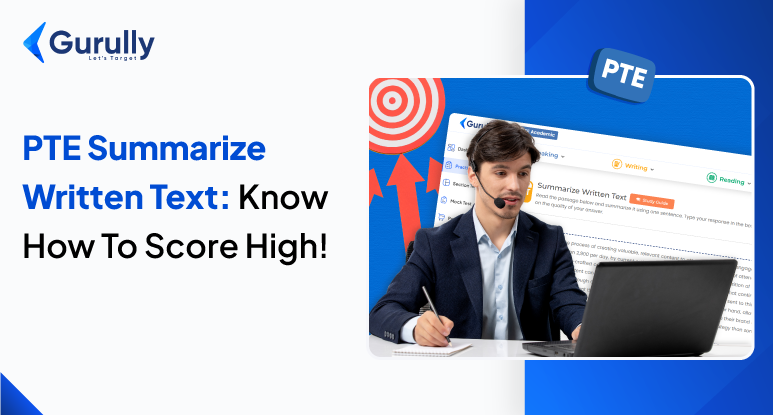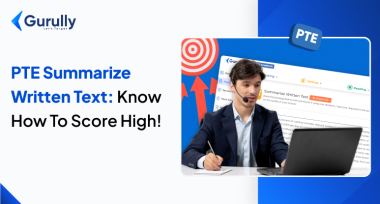The PTE Exam is becoming the most demanding Language proficiency test among students. Its wider acceptance across global universities is making it a prominent choice. But to clear the exam with flying colors, you must prepare well. Though the exam format is not that tough, some of the question types might need extra attention. And PTE Summarize Written Text is one of them.
The PTE Summarize Written Text (SWT) task can seem challenging, but mastering it is essential for anyone looking to boost overall PTE score. In this section, you are given a passage of up to 300 words and are required to summarize it in a single sentence, between 5 and 75 words for PTE Academic. For PTE core, the passage length will be around 200 words and required to summarize in 1 or 2 sentences between 25 & 50 words (PTE Core) within 10 minutes.
Format of “PTE Summarize Written Text” Question type:
What you need to do:
- Write a summary: You need to take the main points from a reading passage and put them into one sentence.
- Keep it short: This sentence should be no longer than 75 words in PTE academic & 50 words in PTE Core.
- Time limit: You have 10 minutes to write your summary.
Helpful tools:
- Word count: There’s a tool at the bottom of the screen that tells you how many words you’ve written.
- Cut, copy, and paste: You can use these buttons to move words around in your summary.
Remember:
- Focus on the main points: Try to include the most important information from the reading passage.
- Be clear and concise: Use simple language and avoid unnecessary words.
- Stay within the word limit: Make sure your summary is no longer than the desired word limit.
Guideline To Score Full in PTE Summarize Written Text
1. Understand the Passage:
Spend time understanding the passage; don’t start writing immediately. Look for the main idea and identify key points, such as supporting arguments or examples. Focus on:
- The first and last sentences: They often contain the core idea.
- Repetition: Key ideas are often repeated throughout the passage. Use connectors like and, but, while, and because to link different ideas.
2. Use Simple Sentence Structures:
As grammar is a scoring factor, you must write a simple sentence with no errors.
Frame structure like:

3. Focus On Grammar & Vocabulary:
Grammar plays a crucial role in this task. Incorrect punctuation, subject-verb agreement errors, or awkward phrasing can lower your score. Use correct punctuation, and make sure the sentence is grammatically flawless.
4. Keep It To The Point:
Do not copy the entire chunk of the text; instead, paraphrase the content and include the important details. Your response will be evaluated on your ability to summarize well, which will showcase a strong command of English and comprehension of the material.
Note: Use synonyms and shorter forms of words to replace long phrases in the original passage.
5. Practice Active Reading:
Developing active reading skills will help you spot the most important information quickly. As you read, think in a pattern.
Note: Break down the passage by who, what, when, where, why, and how. These questions will guide you in identifying the most critical points in the text.
6. Use Keywords for Context:
Ensure your sentence includes the keywords from the passage that encapsulates the main theme. These keywords often help identify the central focus of the text.
Tip: Use punctuation like commas and semi-colons wisely to manage long sentences.
7. Proofread Before Submitting:
Before submitting your response, always proofread for errors, such as:
- Grammar or spelling mistakes
- Missing or misplaced punctuation
- Sentence structure issues: This final check can save you from small errors that might cost you valuable points.
8. Word Limit for PTE Summarize written text:
The word limit for PTE Academic Summarize written text is between 5 to 75 words. You will be penalized and lose marks for this question if you cross the limit. However, for PTE core the word limit is different. You need to write a summary between 25 to 50 words. In PTE core you can use multiple sentence to write your answer.
9. Practice On PTE Mock Test:
The more you practice summarizing texts, the better you will get at identifying key ideas and crafting well-structured sentences. You can take a section-wise practice test on Gurully and ace this question type.
Also Read: PTE Write From Dictation Tips & Tricks to Score Higher
Summarize Written Text Template For PTE Academic
Sample Paragraph:
Climate change has profoundly impacted the Arctic region, leading to significant alterations in the habitats and behaviors of its native wildlife. The Arctic is warming nearly twice the global average, causing rapid melting of sea ice and permafrost. These environmental changes have dire consequences for species that rely on ice-covered habitats for survival. Polar bears, for instance, depend on sea ice as a platform to hunt seals. The reduction in sea ice forces them to swim longer distances and spend more time on land, where food is scarce. This leads to decreased body condition, lower reproductive rates, and increased mortality. Similarly, walruses use sea ice as resting platforms between feeding bouts on the ocean floor. Ice loss compels them to haul out on land in large numbers, increasing calf mortality due to trampling.
Moreover, the warming climate is altering the distribution of species. Animals like the red fox are moving northward, encroaching on the territory of the Arctic fox and competing for resources. Changes in vegetation patterns due to thawing permafrost affect herbivores like caribou and musk oxen, disrupting migration patterns and food availability. Marine ecosystems are also affected. Warmer ocean temperatures and acidification impact plankton populations, forming the marine food web base. This has cascading effects on fish, seabirds, and marine mammals.
Additionally, the timing of biological events, such as plankton blooms, is shifting, leading to mismatches in the food chain. Human activities exacerbated by climate change, such as increased shipping and resource extraction due to reduced ice cover, pose additional threats through pollution and habitat disturbance. Conservation efforts are challenged by the vastness and remoteness of the Arctic, as well as the international cooperation required to address climate change effectively.Sample Answer:
Climate change is drastically affecting the Arctic, leading to the melting of sea ice and permafrost, which disrupts native wildlife habitats, alters species behaviors and distributions, impacts marine ecosystems, and causes food chain mismatches; however, human activities like increased shipping and resource extraction exacerbate these effects, posing additional challenges to conservation efforts in this remote and vulnerable region.
Strategy used in sample answer:
- Identify the key points: The paragraph talks about climate change’s impact on the Arctic, including melting ice, disrupted wildlife habitats, and human activities.
- Combine the points into one sentence: The sample answer effectively combines all of these ideas, ensuring that the main themes (melting ice, changes in wildlife, human activity) are included.
- Keep it concise: The sample answer avoids unnecessary details and sticks to the major impacts of climate change, while keeping the sentence grammatically correct and clear.
Summarize Written Text Template For PTE Core
Sample Paragraph:
Abstract art emerged in the early 20th century, breaking away from traditional representational forms. It focuses on shapes, colors, and forms that do not necessarily depict reality but evoke emotions and ideas through non-figurative elements. Artists like Wassily Kandinsky, Piet Mondrian, and Kazimir Malevich were pioneers of this movement, each contributing unique perspectives.
Kandinsky, often regarded as one of the founders of abstract art, believed that art should express the inner self rather than imitate nature. Through his “De Stijl” movement, Mondrian focused on simplicity, using straight lines and primary colors to create a sense of harmony. With his Suprematist style, Malevich reduced art to its primary geometric forms, as seen in his famous painting “Black Square.”
Abstract art revolutionized how art was perceived, emphasizing artistic freedom and the subjectivity of interpretation. It opened the door to movements like Abstract Expressionism, with artists like Jackson Pollock and Mark Rothko pushing boundaries further. Abstract art remains a vital and influential genre, continuing to challenge conventional ideas of what art can be.Sample Answer:
Abstract art, emerging in the early 20th century with pioneers like Kandinsky, Mondrian, and Malevich, transformed artistic expression by focusing on non-representational forms. It emphasized emotional and intellectual interpretation, influencing later movements like Abstract Expressionism.
Strategy used in sample answer:
- Focus on the main points: The paragraph talks about the origin of abstract art, key pioneers (Kandinsky, Mondrian, Malevich), their contributions, and how abstract art influenced later movements.
- Combine key details: The sample answer combines these ideas into one sentence, mentioning abstract art’s emergence, key artists, and its impact on future art movements.
- Keep it concise: The answer avoids specific examples (like “Black Square”) but includes all the essential information in a clear, condensed form.
Time Management Tips For PTE Summarize Written Text
Effective time management and organization are crucial for success in this PTE writing task. With only 10 minutes to complete the task, it’s essential to allocate your time wisely to ensure your response is accurate, complete, and coherent.
Here are some tips for managing your time effectively:
- First 2-3 minutes: Carefully read the text and identify the main point and key points.
- Next 4-5 minutes: Organize the key points and construct a clear and concise sentence.
- Last 1-2 minutes: Review your response for grammatical and structural errors.
Prioritize the key points and focus on the most important information. Avoid trying to include too much information, as this can lead to errors and a lower score. By managing your time effectively, you can ensure that your response is well-organized and meets the requirements of the task.
Understand How Scoring Of PTE Summarize Written Text Is Done
The Scoring is done on 4 factors: Content, Form, Grammar, Vocabulary.
Content:
Content is scored by determining all four key points of the passage addressed in the answer without misinterpreting the core meaning. If your summary does not tell what is written in the paragraph, you will not receive any score for any of the four factors. You will get a Zero. But if your summary clearly explains the zest of the paragraph, then you will get a score for this part.
Form:
In this, the Scoring is done on the basis of “if your response is meeting the requirements of a one-sentence summary.” Your summary should be between 5-75 words. If the word limit does not match these word counts, then you will not receive any score on any of the four factors (Content, Form, Grammar, Vocabulary)
Grammar:
Grammar is the third factor in which Scoring is done. The requirement for this factor is that your grammar is correct. The response will be scored based on the structure of the sentence and whether it is grammatically correct or not. You will get scoring according to the correctness of your sentence.
Vocabulary:
In the vocabulary factor, your response is scored based on – the usage of the correct and appropriate words. Scoring will be done on the proper usage of synonyms and the appropriateness of words according to the passage’s context.
Things To Keep In Mind:
- Response is scored either correct or incorrect based on the above 4 factors. No credit will be given for no response or an incorrect response.
- Your listening and speaking skills will not be tested in PTE Summarize Written Text.
You can practice more of this question type on Gurully’s online practice platform. We provide full-length mock tests and section-wise tests, which will help you strengthen your practice. You can also use our free online PTE practice app. Gurully’s mock tests provide AI scoring so that you will get instant results, and even for the last-day preparation, you can choose our day-wise packages.
Conclusion:
Mastering the PTE Summarize Written Text task requires a combination of careful reading, concise writing, and strong grammatical skills. By understanding the passage, identifying key points, using simple sentence structures, and practicing regularly, you can effectively summarize the text within the given word limit and improve your overall PTE score. Remember to proofread your work and take advantage of practice tests to enhance your performance.
Also Read:








